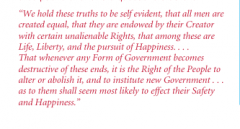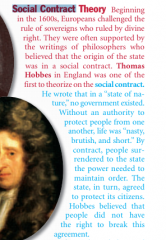![]()
![]()
![]()
Use LEFT and RIGHT arrow keys to navigate between flashcards;
Use UP and DOWN arrow keys to flip the card;
H to show hint;
A reads text to speech;
25 Cards in this Set
- Front
- Back
|
Federalist Papers
|
Series of articles & essays written by Alexander Hamilton, James Madison & John Jay promoting the ratification of the Constitution, in turn making a more perfect union, which will give the people safety and general welfare
|
|
|
Why did the Founding Fathers create a government based on federalism?
|
There were many disagreements at the Constitutional Convention. Many delegates feared a national government that was too strong and many delegates feared that states' rights would merely continue the weak form of government under the Articles. The Constitution created a federal system of government (federalism) as a compromise. Under federalism, power is shared and divided between national and state governments. Each has specific powers unto themselves while they also share certain powers. Both levels have their own agencies and officials and directly affect the people. The Founding Fathers really had no other choice except federalism
|
|
|
Concept of religious diversity/freedom
|
Racial, ethnic, religious or other discriminatory tests cannot be used to prevent someone from voting. Democracy is not possible without a civil society, a network of ....religious organizations and other organizations that operate independently of the government.
|
|
|
How are US Senators chosen today that is different from the past?
|
In past times, the 2 senators were selected by the states, a move made by the government in an effort to up states' chances of ratifying the Constitution. However, now they are chosen by direct election by the people.
|
|
|
Examples of responsibilities of state governments
|
State governments must be proficient in: making laws that are suitable and applicable to its people as a whole, shaping foreign policy, determining its course of action, public services, enforcement of its decisions, maintaining of social order, providing national security/defense, controlling the economic system
|
|
|
The Great Compromise
|
A delegate from Connecticut, Roger Sherman, proposed a two-house legislature, consisting of a Senate and a House of Representatives. The Senate would have an equal number of representatives from each state. This would satisfy the states with smaller populations. The House of Representatives would include one representative for each 30,000 individuals in a state. This pleased states with larger populations.
|
|
|
Examples of the legislative process
|
All legislation begins as an idea or concept. Ideas and concepts can come from a variety of sources. The process begins when a Senator or Assembly Member decides to author a bill.A Legislator sends the idea for the bill to the Legislative Counsel where it is drafted into the actual bill. The draft of the bill is returned to the Legislator for introduction. If the author is a Senator, the bill is introduced in the Senate. If the author is an Assembly Member, the bill is introduced in the Assembly.
|
|
|
Concepts of expressed, concurrent, and reserved powers
|
Expressed Powers refers to those that have been specifically stated, that is, word for word in the Constitution. Concurrent powers are powers that are held by both the states and the federal government and may be exercised simultaneously within the same territory and in relation to the same body of citizens. Reserved power is a political power that is not enumerated or prohibited by a constitution, but instead is reserved by the constitution for a specified political authority, such as a state government.
|
|
|
Political philosophy of Thomas Jefferson
|
The Jeffersonians believed in a republic, as form of government, and equality of political opportunity, with a priority for the "yeoman farmer", "planters" and the "plain folk". They were antagonistic to the aristocratic elitism of merchants and manufacturers, distrusted factory workers, and were on the watch for supporters of the dreaded British system of government. Above all, the Jeffersonians were devoted to the principles of Republicanism, especially civic duty and opposition to privilege, aristocracy and corruption. Separation of church and state is the best method to keep government free of religious disputes, and religion free from corruption by government. The federal government must not violate the rights of individuals. The Bill of Rights is a central theme.
The federal government must not violate the rights of the state. Basically, Jefferson was a sensible man all about rights & freedoms. |
|
|
Examples of Government and the economy
|
Laissez-faire; the government's innovation of Social Security & jobs for the unemployed & the TVA when the Great Depression occurred; Nowadays, the economy is mixed, run mostly by free enterprise with a bit of governmental input. 4 types of economy: command, socialist, democratic socialist, and communist.
|
|
|
Montesquieu
|
Montesquieu was a French social commentator and political thinker who lived during the Age of Enlightenment. He is famous for his articulation of the theory of separation of powers, which is taken for granted in modern discussions of government and implemented in many constitutions throughout the world.
|
|
|
Principles of the Declaration of Independence
|

|
|
|
Authoritarianism vs. Democracy
|
Authoritarianism is a form of government as well as a personality and social trait. It is characterized by absolute or blind obedience to authority, as against individual freedom and related to the expectation of unquestioning obedience. In democracy, the people are expected to cast their votes and air their concerns; they are opposites.
|
|
|
Why would the U.S. seek to limit the development of business monopolies?
|
If a monopoly is made, price discrimination will begin. Price discrimination allows a monopolist to increase its profit by charging higher prices for identical goods to those who are willing or able to pay more.
|
|
|
Popular sovereignty
|
Popular sovereignty or the sovereignty of the people is the principle that the authority of the government is created and sustained by the consent of its people (Rule by the People), who are the source of all political power.
|
|
|
Magna Carta
|
It was signed (by royal seal) between the feudal barons and King John at Runnymede near Windsor Castle. The document was a series of written promises between the king and his subjects that he, the king, would govern England and deal with its people according to the customs of feudal law. Magna Carta was an attempt by the barons to stop a king - in this case John - abusing his power with the people of England suffering.
|
|
|
According to John Locke, what was the primary purpose of government?
|
To protect those natural rights that the individual can not effectively protect in a state of nature
|
|
|
Examples of command and market economies
|
Communist nations are command economies, as the head honchos make all of the decisions. Market economies, such as our own mix command economy with free enterprise.
|
|
|
What is a disadvantage of a confederate form of government?
|
The disadvantage of a confederate government is that the weakness of the central government makes it unable to enforce laws or collect taxes.
|
|
|
How did the Bill of Rights help resolve the differences between the Federalists and Anti-Federalists?
|
The Anti-federalists argued about the danger of a powerful government; similar to the British government from which they had just been freed. And also noted the absence of a Bill of Rights to protect the rights of individual citizens or of the states. So, when the Bill was passed, ratification began.
|
|
|
Why doesn’t the government of the United States control any large industries?
|
The US economy is rooted in self-initiative and the government feels that we are entitled to economic choice.
|
|
|
Unitary v. federal government
|
A unitary gov gives all of the power to the central or national government, whereas a federal government divides the power between a state and national level.
|
|
|
Checks & Balances
|
These three branches are not independent of one another because the Constitution set up a system of checks and balances to help ensure that no one branch became too powerful. Each branch has powers that it can use to check and balance the operations and power of the other two branches.
|
|
|
Social Contract
|

|
|
|
Advantages of a Written Constitution
|
A written constitution allows the affirmation of basic human rights, ensuring that government operates by established rules and with constitutional and moral legitimacy. It establishes a permanent written document of fundamental laws. The constitution is supreme and guides the government.
|

